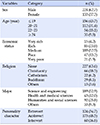1. Diener E. Subjective well-being. Psychological Bulletin. 1984; 95(3):542–575.

2. Diener E. Assessing subjective well-being: progress and opportunities. Social Indicators Research. 1994; 31(2):103–157. DOI:
10.1007/BF01207052.

4. Song IS, Hong D, Park HS. The effects of family strength on happiness as perceived by college students. Korean Journal of Family Welfare. 2013; 18(4):579–598.

5. Choi M, Cho S. Structural analysis of factors influencing university students' happiness. Journal of Korean Home Management Association. 2016; 34(1):49–63. DOI:
10.7466/JKHMA.2016.34.1.49.

6. Seo IK, Lee YS. Effects of college students' hopelessness upon their happiness: moderating effects of social support. The Journal of the Korea Contents Association. 2016; 16(6):193–204. DOI:
10.5392/JKCA.2016.16.06.193.

7. Cho H. A study on the stress involved in preparing for employment on college student's happiness: the moderating effects of social support. Studies on Korean Youth. 2013; 24(1):157–184.
8. Bronfenbrenner U. The ecology of human development: experiments by nature and design. Cambridge, MA: Harvard University Press;1979. p. 330.
9. McLeroy KR, Bibeau D, Steckler A, Glanz K. An ecological perspective on health promotion programs. Health Education Quarterly. 1988; 15(4):351–377.

10. Kim YS, Han MY. Factors influencing happiness index of nursing students. Journal of Korean Academy of Nursing Administration. 2015; 21(5):501–510. DOI:
10.11111/jkana.2015.21.5.501.

11. Stevens J. Applied multivariate statistics for the social sciences. 3rd ed. Mahwah, NJ: Lawrence Erlbaum Associates;1996. p. 734.
12. Argyle M, Martin M, Crossland J. Happiness as a function of personality and social encounters. Netherlands: Elsevier;1989. p. 543.
13. Hills P, Argyle M. The Oxford Happiness Questionnaire: a compact scale for the measurement of psychological well-being. Personality and Individual Differences. 2002; 33(7):1073–1082. DOI:
10.1016/S0191-8869(01)00213-6.

14. Bae H. The relationship among family cohesion, self-differentiation and happiness in college students [master's thesis]. Masan: Kyungnam University;2003. 53 p.
15. Olson DH, Portner J, Lavee Y. Faces III: family adaptability and cohesion evaluation scales, family social science. St. Paul: University of Minnesota;1985. p. 41.
16. Kim SY, Kang BG, Kim DS. A study on comparison between normal family and problem family by circumplex model. Korean Journal of Family Welfare Association. 1998; 3(2):17–37.
17. Dubow EF, Ullman DG. Assessing social support in elementary school children: the survey of children's social support. Journal of Clinical Child Psychology. 1989; 18(1):52–64. DOI:
10.1207/s15374424jccp1801_7.

18. Han MH. A study on stress, perceived social supports, and behavior problems of children [dissertation]. Seoul: Seoul National University;1996. 137 p.
19. Rosenberg M. Conceiving the self. New York, NY: Basic Books;1979. p. 319.
20. Block J, Kremen AM. IQ and ego-resiliency: conceptual and empirical connection and separateness. Journal of Personality and Social Psychology. 1996; 70:349–361. DOI:
10.1037/0022-3514.70.2.349.

21. Yoo SK, Shim HW. Psychological protective factors in resilient adolescents in Korea. The Korean Journal of Educational Psychology. 2002; 16(4):189–206.

22. Sung EM, Kim GH. The structural relationships analysis among happiness, personal traits, and environments traits of adolescents using the structural equation modeling. Studies on Korean Youth. 2013; 24(4):177–202.
23. Kim SJ. A structural equation model for happiness in middle-aged women [dissertation]. Daejeon: Eulji University;2015. 107 p.
24. Nam MH, Lee MR. Factors influencing subjective happiness index of health behavior, self esteem and major satisfaction by nursing students. The Korea Society of Digital Policy and Management. 2014; 12(10):363–374. DOI:
10.14400/JDC.2014.12.10.363.

25. Kim S, Lee S. The influence of job-seeking stress, career decision- making self-efficacy, self-esteem and academic achievement on nursing students' happiness. Korean Journal of Adult Nursing. 2015; 27(1):63–72. DOI:
10.7475/kjan.2015.27.1.63.

26. Lee HN, Jeong HJ, Lee KH, Lee HJ. The relationship among stress perception, stress coping, ego-resilience and happiness of university students. The Korea Journal of Counseling. 2006; 7(3):701–713.
27. Lee HN. Concept analysis of happiness on Korean university students using hybrid model. Journal of the Korea Academia-Industrial cooperation Society. 2018; 19(11):357–369. DOI:
10.5762/KAIS.2018.19.11.357.
28. Kang HK. Family strengths and ego-resilience of school-aged children. Journal of Korean Home Management Association. 2005; 23(3):93–102.
29. Seo HJ, Kim JO. Self-esteem and happiness caused by university student's perception of family strengths. Journal of Family Relations. 2009; 14(3):141–178.
30. Lee DS, Padilla AM. Predicting South Korean university students' happiness through social support and efficacy beliefs. International Journal for the Advancement of Counselling. 2016; 38(1):48–60. DOI:
10.1007/s10447-015-9255-2.





 PDF
PDF ePub
ePub Citation
Citation Print
Print








 XML Download
XML Download